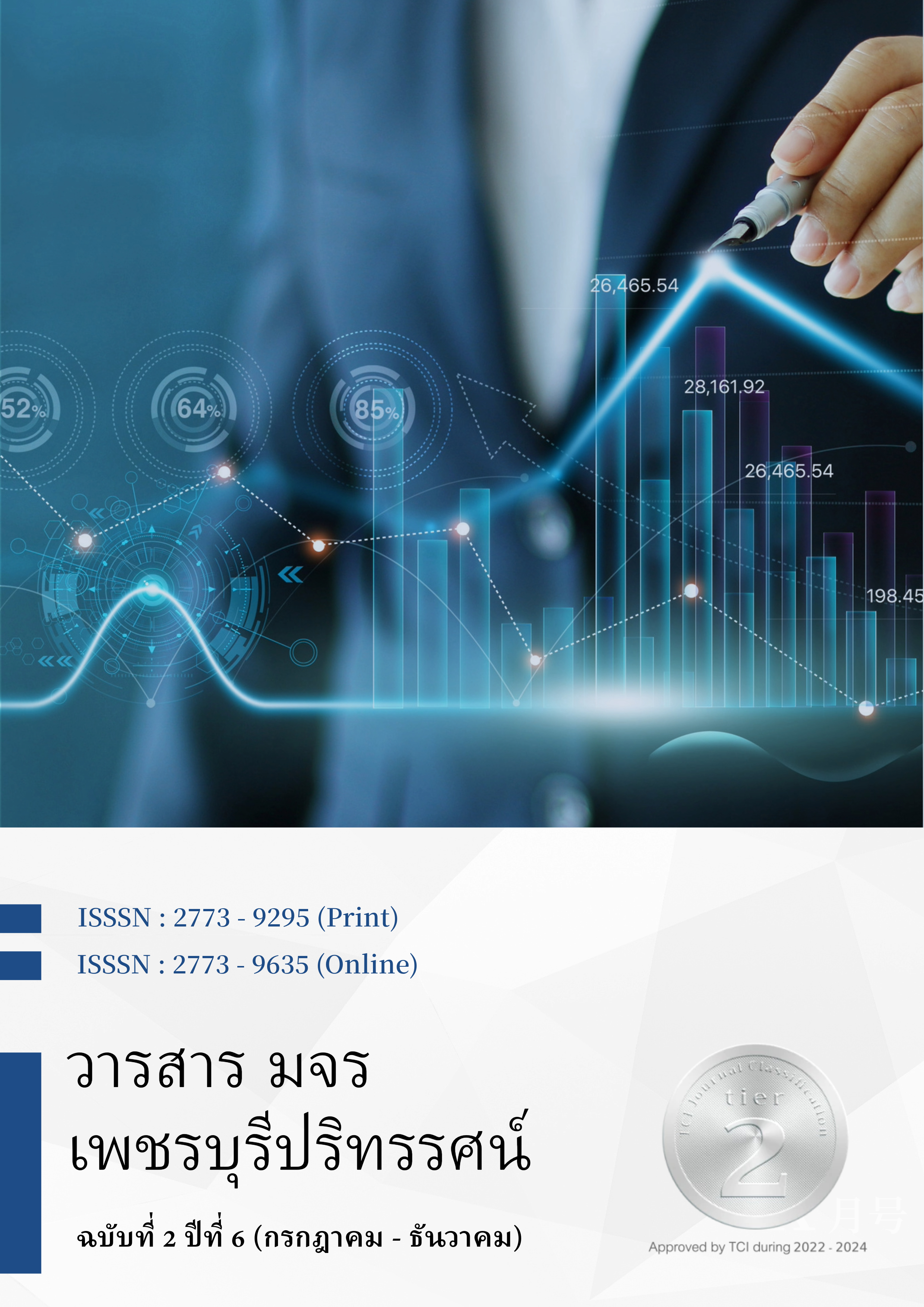DEVELOPMENT OF THE ABILITY TO DELIVER ACTIVE LEARNING INSTRUCTION OF ELEMENTARY SCHOOL STUDENTS TEACHERS THOUGH COACHING
Main Article Content
Abstract
This research aimed to 1) develop elementary school student teachers’ ability to deliver active learning instruction, 2) explore the elementary school student teachers’ satisfaction with coaching, and 3) explore elementary school students’ satisfaction with the instruction delivered by the elementary school student teachers. The research design was quasi experimental research. Data was collected from target populations, consisting of 1) twenty 5th-year elementary school student teachers undergoing teacher profession training in the second semester of the academic year 2022, who were voluntarily sampled, 2) three university supervisors, who were purposively sampled with some criteria, as follows: having knowledge and experience in elementary education, teaching, supervising, and volunteering to be involved in the development; and 3) students under the responsibility of the elementary school student teachers. The research instruments as are follows: a coaching plan, a satisfaction survey for the elementary school student teachers to evaluate their satisfaction with the coaching process, and a satisfaction survey for the elementary school students to evaluate their satisfaction with the student teachers’ instruction. The data analysis was conducted using mean (x̅), standard deviation (S.D.), t-test for dependent, and content analysis. The findings are as follows: 1) the post-coaching elementary school student teachers’ ability to deliver active learning instruction was higher than their pre-coaching ability at a statistically significant level of .01; 2) the elementary school student teachers’ satisfaction with the coaching process was at a high level; and 3) the elementary school students’ satisfaction with the instruction delivered by the student teachers was at a high level.
Article Details

This work is licensed under a Creative Commons Attribution-NonCommercial-NoDerivatives 4.0 International License.
References
กระทรวงศึกษาธิการ. (2545). พระราชบัญญัติการศึกษาแห่งชาติ พ.ศ.2542 และที่แก้ไขเพิ่มเติม (ฉบับที่ 2) พ.ศ.2545. กรุงเทพฯ: โรงพิมพ์คุรุสภาลาดพร้าว.
ดวงหทัย โฮมไชยะวงศ์. (2557). การพัฒนารูปแบบการเรียนการสอนที่เน้นการโค้ชและการดูแลให้ คำปรึกษาแนะนำเพื่อส่งเสริมสมรรถนะครูประถมศึกษาของนักศึกษาวิชาชีพครู. (วิทยานิพนธ์ปรัชญา ดุษฎีบัณฑิตสาขาวิชาหลักสูตรและการสอน). บัณฑิตวิทยาลัย มหาวิทยาลัยศิลปากร.
ปรณัฐ กิจรุ่งเรือง. (2558). การวิจัยเชิงปฏิบัติการแบบมีส่วนร่วมเพื่อพัฒนารูปแบบการสร้างเสริมศักยภาพอาจารย์นิเทศก์ และอาจารย์พี่เลี้ยงเพื่อพัฒนาความ
สามารถด้านการเป็นพี่เลี้ยงทางวิชาการสำหรับนักศึกษาฝึกประสบการณ์วิชาชีพครู. นครปฐม: คณะศึกษาศาสตร์ มหาวิทยาลัยศิลปากร. (ทุนสำนักงานคณะ
กรรมการการวิจัยแห่งชาติ).
ปรณัฐ กิจรุ่งเรือง และคณะ. (2560). รูปแบบนวัตกรรมที่สร้างสรรค์การเรียนรู้: จากชุมชนการเรียนรู้เชิงวิชาชีพ ครูสู่คุณภาพผู้เรียน. เอกสารประกอบการบรรยายงาน
มหกรรมการศึกษาเพื่อพัฒนาวิชาชีพครู ครั้งที่ 9 ห้อง Sapphire 106 อาคารอิมแพคฟอรั่ม เมืองทองธานี วันที่ 16 ตุลาคม 2560.
ปรณัฐ กิจรุ่งเรือง และอรพิณ ศิริสัมพันธ์. (2561). รูปแบบการสร้างโรงเรียนเป็นชุมชนแห่งการเรียนรู้เชิงวิชาชีพครู (School as Learning Community) เพื่อ
พัฒนานวัตกรรมที่สร้างสรรค์การเรียนรู้สำหรับครูในภูมิภาคตะวันตก. นครปฐม: คณะศึกษาศาสตร์ มหาวิทยาลัยศิลปากร. (ทุนสำนักงานคณะกรรมการวิจัย
แห่งชาติ).
ปิยะฉัตร จิตต์ธรรม และคณะ. (2558). โครงการวิจัยและพัฒนาครูในจังหวัดสมุทรสาครด้วยระบบหนุนนำ ต่อเนื่อง (Teacher Coaching) เพื่อยกระดับคุณภาพการ
จัดการเรียนรู้ที่ส่งเสริมองค์ความรู้และทักษะแห่งศตวรรษที่ 21 ของนักเรียน. นครปฐม: สถาบันนวัตกรรมการเรียนรู้ มหาวิทยาลัยมหิดล. (ทุน สำนักงาน
กองทุนสนับสนุนการวิจัย).
พนิดา จารย์อุปการะ. (2557). รูปแบบการพัฒนาวิชาชีพเพื่อเสริมสร้างสมรรถนะการโค้ชของครูหัวหน้ากลุ่มสาระการเรียนรู้โรงเรียนในสังกัดมณฑลราชบุรี.
(วิทยานิพนธ์ปรัชญาดุษฎีบัณฑิตสาขาวิชาหลักสูตรและการสอน). บัณฑิตวิทยาลัย มหาวิทยาลัยศิลปากร.
พิมพันธ์ เดชะคุปต์ และพเยาว์ ยินดีสุข. (2558). รู้เนื้อหาก่อนสอนเก่ง การเปลี่ยนแปลงคุณภาพในศตวรรษที่ ๒๑. กรุงเทพมหานคร: โรงพิมพ์แห่งจุฬาลงกรณ์
มหาวิทยาลัย.
วัชรา เล่าเรียนดี. (2556). ศาสตร์การนิเทศการสอนและการโค้ช. พิมพ์ครั้งที่ 10. นครปฐม: คณะศึกษาศาสตร์ มหาวิทยาลัยศิลปากร.
วัชรา เล่าเรียนดี, ปรณัฐ กิจรุ่งเรือง และอรพิณ ศิริสัมพันธ์. (2560). กลยุทธ์การจัดการเรียนรู้เชิงรุกเพื่อพัฒนา ทักษะการคิดและยกระดับคุณภาพการศึกษา.
นครปฐม: เพชรเกษมการพิมพ์.
สถาบันส่งเสริมการสอนวิทยาศาสตร์และเทคโนโลยี. (2563). ผลการประเมิน PISA 2018. [Online]. Retrieved September 5, 2022, from
https://pisathailand.ipst.ac.th/issue-2019-48/
สำนักงานเลขาธิการสภาการศึกษา. (2560). แผนการศึกษาแห่งชาติ พ.ศ. 2560 - 2579. กรุงเทพมหานคร: พริกหวานกราฟฟิก.
Anchunda, Y.A. (2021). A Teacher Development Model Based on Coaching and Professional Learning Community (PLC) to Enhance
Foreign Teachers’ Effective Teaching Ability in Thailand. Kasetsart Journal of Social Sciences, 42(2021): 932-939.
Bedford, L. Downs, L.D., McDowell, M. (2021). Coaching for Professional Development for Online Higher Education Faculty: An
Explanatory Case Study. Online Journal of Distance Learning Administration, XXIV, Number 3, Fall 2021. University of West Georgia, Distance Education Center. [Online]. Retrieved August 5, 2022, from
https://ojdla.com/assets/pdf/bedford_downs_mcdowell243.pdf
Correia, M.P., and McHenry, J.M. (2002). The Mentor’s Handbook. Christopher-Gordon. Publishing, Inc.
Kitroongrueng, P. (2016). The Development of Potential Enhancement Model for Supervisors and Cooperating Teachers to Develop the
Abilities to be Mentors for Student Teachers. In Proceeding of an EDULEARN 16, 8th International Conference on Education and
New Learning Technologies. 173-179. Barcelona, Spain, July 4th – 6th.
Kraft, M.A., Blazar, D., Hogan, D. (2018). The Effect of Teaching Coaching on Instruction and Achievement: A Meta-Analysis of The Causal
Evidence. Review of Educational Research, 88(4): 547-588.
Meyers, C., and Jones, T. B. (1993). Promoting Active Learning: Strategies for the College Classroom. San Francisco, CA: Jossey-Bass Inc.
Neufeld, B., and Roper, D. (2003). Coaching: A Strategy for Developing Instructional Capacity, Promises, and Practicalities. Washington,
D.C.: Aspen Institute Program on Education and Providence, RI: Annenberg Institute for School Reform, 2003.
Patti, J., Holzer, A.A., Stern, R., Brackett, M.A. (2012). Personal, Professional Coaching: Transforming Professional Development for Teacher
and Administrative Leaders. Journal of Leadership Education, 11(1) Winter 2012: 263-277.
Songsiengchai, S. (2021). The Study of The Effectiveness of Coaching Program for Pre-service Teachers to Communicative Listening-Speaking Skills. Advances in Language and Literary Studies, 12(2): 21-30.
Sweeny, B.W. (2008). Teacher Induction and Mentoring Program. 2nd ed. Corwin Press.
Tileston, D.W. (2007). Teaching Strategies for Active Learning: Five Essentials for Your Teaching Plan. CA: Corwin Press.


